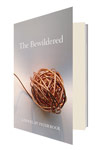Peter Rock has spent the last few years, and his last few novels, exploring “different ways of life.” He became a psychiatric trial “lab rat” while researching his novel, The Ambidextrist (2002), and is repeatedly drawn to society’s disenfranchised and marginalized citizens. Rock’s new novel, The Bewildered, focuses on three outsider pubescent kids, Kayla, Chris, and Leon. The kids set out to find “bewilderment”—which translates, for them, to locating something real among all the bullshit. They run into Natalie, a “bewildered” adult consumed by the obsessive study of 1970s Playboy Playmates. Natalie hires the three kids to harvest copper wire from telephone poles in clandestine raids. Soon, it becomes clear that bewilderment is related, in some way, to electricity. Natalie has had an electrical “accident.” Soon, Leon does as well.
Eventually, Kayla and Chris discover the research of a man called Chesterton and his interest in the people he calls “The Affected.”
Chesterton writes in his diary:
The Affected are those individuals who have been electrocuted almost to the degree of death… they remain suspended… between life and death….
Are there reasons beyond curiosity that have led me to develop these theories…?
The central idea in The Bewildered is that “real life” lies hidden, somewhere, at the margins of the actual world we inhabit. There have been such novels before. Melville and Conrad were also after such fare, though they thought you had to catch a ship bound for humid places to find it. They looked for the real “thingness” of things at the margins of civilization. Writers like Rock look for it hiding in the interior of civilization itself, at its rotten core or in its forgotten corners.
So it is appropriate that Rock’s novel revolves around three searching kids on the verge of adulthood. Part of adolescence, it would seem, is the trauma of coming to terms with an adult world that seems gray and compromised. The adolescents of Rock’s novel are looking for a different passage to a different place.
“Still,’’ Chris said, “you see how everyone acts at school—you give yourself over to that, it forces all the thoughts out of your head.”
“And as soon as you start copulating,” Leon said, “you can have children, of course—and then you might become a parent.”
“It’s not completely their fault,” Kayla said.
“They should have seen it coming.”
“And we’ll become just like them if we’re not careful,” Chris said.
“Maybe, maybe not,” Leon said.
“Unless,” she said, “unless we can figure out another way to be.”
The Bewildered is about precisely that—“finding another way to be.” One option, given this goal, would have been to indulge completely in fantasy, thus bringing the novel closer to Robert Louis Stevenson or maybe The Secret Garden. But Rock wants to express something more vague and unsettling. The Affected, while extraordinary to some unspecified degree, are also half-zombified. “Real life,” heightened life, is also a negation of normal life, and therefore shares a similarity with death. Rock recognizes that there is something dark about the desire to negate everyday life in the name of something more inspiring.





